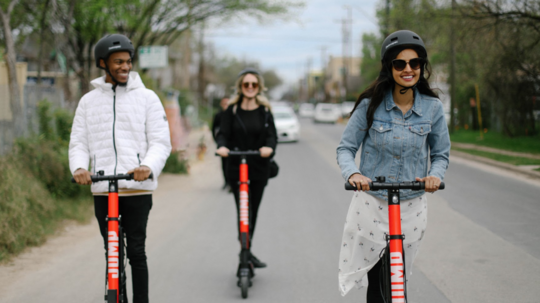
One of the most controversial modes of transportation is finally coming to Chicago this weekend as the city launches an electric scooter pilot.
The pilot, which runs from June 15 to October 15, was first announced in May by Chicago’s Department of Business Affairs and Consumer Protection and Department of Transportation. But this week, the city announced the 10 electric scooter companies that were selected to participate in the pilot. They include Bird, Bolt, gruv, Jump, Lime, Lyft, Sherpa, Spin, VeoRide and Wheels.
Each company is allowed to operate 250 scooters in the pilot, meaning there will be about 2,500 scooters available for use in the pilot’s 50-square mile zone on the city’s West Side. The zone is bounded by Halsted Street and the Chicago River on the east, Irving Park Road on the north, the city’s boundary and Harlem Avenue on the west, and the Chicago River on the south. Neighborhoods covered in the pilot include Austin, Avondale, Pilsen and South Lawndale.
Throughout the application process, scooter companies were required to submit ideas for how they plan to engage with local businesses, provide equitable services to the unbanked on non-smartphone users, ensure access for individuals with disabilities and hire locally.
Chicago and the selected vendors are rolling out a comprehensive education campaign to promote safe riding, which includes encouraging helmet use. One scooter company, Lime, is hosting a “safety academy” on the first day of the pilot in Union Park.
The emphasis from the city and scooter vendors on safety stems from problems that have arisen in other cities due to scooter use, such as sidewalk clutter and the destruction of scooters. As part of Chicago’s pilot, scooters are required to be parked upright and parallel to the sidewalk, and away from street corners, bus stops and buildings.
Additionally, scooters are prohibited from operating on sidewalks and will be limited to a maximum of 15 miles per hour. Lastly, scooters will only be available for use from 5 a.m. to 10 p.m. Every night, scooter operators are required to remove them from the streets.
VeoRide is the only Chicago-based scooter company participating in the pilot. Founded in 2017, VeoRide’s scooter differentiates itself from other scooter brands because the company manufactures its own scooters, which the company’s CEO Candice Xie says allows VeoRide to ensure its scooters are durable. The average lifespan of a VeoRide scooter is anywhere from 12 to 24 months, much longer than that of other shared e-scooters, which reportedly last for about 28 days.
VeoRide’s scooter features a dual mechanical break, which Xie says is more reliable than an electronic break. The scooter is also built with mountain bike-like suspension, and its wheels are larger and more powerful than the average scooter.
“At the end of the day, the scooter needs to be safe enough to serve as a shared [method] of transportation,” Xie said.
Additionally, VeoRide’s scooters are powered by swappable batteries, which allows the company’s technicians to replace battery packs on site as opposed to relying on third parties to charge scooters for them.
VeoRide, which also provides an electric bike-sharing service, has about 7,000 bikes and scooters (40 percent are scooters) operating across more than 30 cities and college campuses. In Illinois, VeoRide is already operating in DeKalb and Urbana.
“One of the goals for us is to help the community understand that we’d like to provide a more equitable transportation solution to everyone in the community,” Xie said.
Xie said scooters are the fastest-growing part of VeoRide’s business right now. The startup manufactures its scooters in China, Cambodia and Europe, and the company employs about 125 employees. Xie said VeoRide has taken an undisclosed amount of funding and that it is currently raising another round.
The decision to launch the scooter pilot was made based on recommendations from Chicago’s Transportation and Mobility Task Force that former mayor Rahm Emanuel announced in September. In March, the task force released a report detailing how the new scooter pilot should operate, in addition to plans for expanding dockless bike programs and launching an autonomous vehicle pilot.
Over the course of the pilot, the city said it will be soliciting feedback from residents through surveys, 311 and vendor data to see how the scooters’ presence is impacting Chicagoans.
“Chicago is dedicated to testing the viability of innovative mobility options that have the potential to improve transportation access across the city,” said CDOT Managing Deputy Commissioner Kevin O’Malley in a statement. “Vendors will be held to the highest standards of accountability in how effectively they manage impacts on the public right of way and how they promote the safety of both scooter riders and other people who are in the right of way.”








